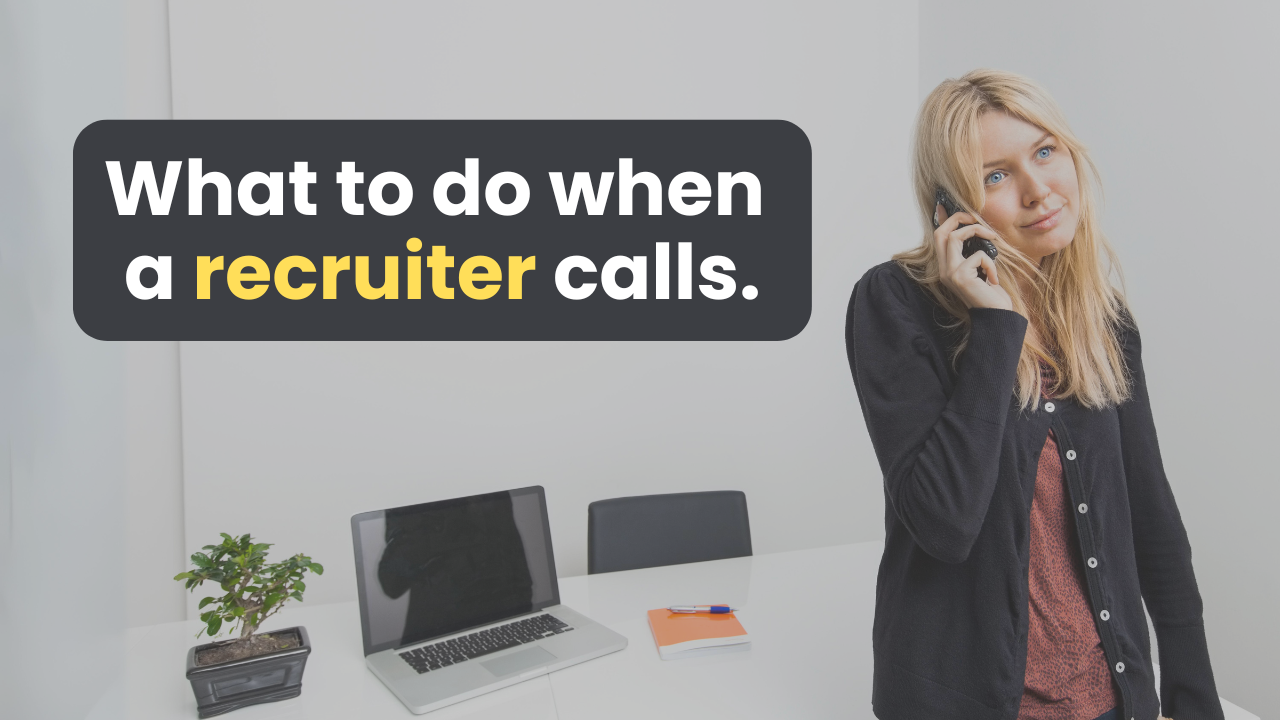
What to do and how to be ready when a recruiter calls.
If you’re a professional with a strong LinkedIn profile and presence, you should expect to be contacted by recruiters regularly. If you’re a startup executive, it might once have even been from me.
Recruiters reaching out is a good thing.
I often hear people complaining about recruiters reaching out to them with the wrong opportunities. Hearing about jobs from recruiters who found you is how many roles are filled.
If recruiters are reaching out with the wrong jobs for you, it's usually because if you have an empty, confusing or out-of-date profile and/or your narrative doesn't position you the way you want to be seen.
But once you update your information and tell a clearer story, people will be reaching out for the right things.
And the truth is that a call or email from a recruiter might change your life. Or , sure, it could be a total bust.
Some of my most successful clients have a personal rule to always take the call... because you’ll never know unless you answer it.
Here are a few things to do when a recruiter reaches out.
Talk to them.
Even if every previous recruiter felt like a waste of time, this could be your big break. I'm not exaggerating.
Now, if the phone rings out of the blue and you're busy, it’s fine to ask to return the call or a message at a time that works for you but do it as soon as you can. And if you get an email, respond as quickly as possible.
Recruiters are often working with a sense of urgency.
Never just blow it off. Always take the call and use it as a chance to grow your network or your knowledge.
network or your knowledge.
Treat it as a networking call.
Even if you’re not open to a new job, it’s worth talking because you might make a new contact who will be there to help when you are.
Or they might be someone you can call the next time you are on the hiring side and have a job to fill.
Recruiters can be good people to know, you know. Especially recruiters who work on searches for peoople like you.
Check them out online.
Sometimes you are contacted by a research person who is sourcing candidates, and sometimes you may be talking to a high-level headhunter.
Or they might be an employee of the hiring company or a third-party recruiter retained to fill that position.
If you have a chance to look before you talk to them, check their and their company’s profile on LinkedIn so you know who you’re talking to.
If they are a third-party recruiter, see if you can find their LinkedIn and if it shows them as a recruiter, and if they work for a reputable agency.
Always have your resume handy.
It’s easier to talk about your experience when you have your resume right in front of you.
If you're in an active search, you need to be ready to put your hands on the tailored resume you made for that job if they call. That’s what the recruiter is looking at and what got them to contact you in the first place.
Keep it somewhere accessible to refresh your memory.
Be gracious and professional.
 Treat a recruiter with the same respect you would a hiring manager. Rudeness is never okay.
Treat a recruiter with the same respect you would a hiring manager. Rudeness is never okay.
Again, think of it as a networking opportunity with someone who you might not need today but who could become a great long-term career connection.
Be warm and energetic.
You are making a first impression, and no matter how tired or busy you are, you have to sound interested and interesting on the call.
Don't sound suspicious or abrupt. Be engaged and responsive and talk to them the way you'd talk to an important customer.
Ask them what kind of recruiter they are.
 It's important to know who you're talking to so you know what to expect.
It's important to know who you're talking to so you know what to expect.
They could be a sourcer or researcher whose job is to source and compile a large list of possible candidates for a job they don't know much about.
Or they could be a retained headhunter calling because their researcher put you on a short list and they are vetting you for their client.
Or they could be a contingency recruiter who only gets paid when their candidate gets hired.
Or it might be the lead recruiter for a company you applied to whose job it is to identify, screen and select the right candidate.
If it's not obvious, just ask them and then you know more about what you might expect. You can just ask "are you an employee of the company or from an outside agency?"
Ask them what they’re specifically looking for.
A good recruiter will know what the job requires. That doesn't mean they are going to tell you everything they know, but they should be able to give you an overview in terms of experience, skills and level.
Take notes of everything they say, so you can do some research or refresh your memory later.
Listen between the lines, and make notes of questions you might have if you get moved to the next step.
Ask if they can send you a description or link to a posting (if you don't have that already).
And don't be afraid to ask them where they are in their process and what next steps might be if it seems like you could be a contender.
Balance honesty with discretion.
Don’t give away any confidential, proprietary or personal information to a recruiter you don’t yet know. Not about yourself or about the company you work for.
There are fraudulent job postings and misrepresentations out there so if something feels off, it may well be. No one should be asking you for any personal financial or identifying information.
Ask questions about the job , and see if their answers feel right. When in doubt, proceed with caution and do a lot of extra research.
And if you’re not interested, thank them and tell them what kinds of openings would be right for you, should they see that kind of role.
Recommend someone else if it’s not for you.

If you think the job sounds interesting, but not for you, maybe you know someone who could be right. Recruiters love and appreciate your suggestions.
You can suggest someone anonymously if you want, but it’s never a bad thing to be someone who connects people together for good things.
I recommend always getting the recruiter's info and then checking with your connection for their okay to do an email introduction to them both.
Follow up right away if you are interested.
Recruiters often move fast, and so should you. After your phone call, reinforce the good impression with a follow-up email.
You can include a copy of your resume if you’re actively looking, or send an invitation to connect on LinkedIn with a note thanking them for the call.
The bottom line is that recruiters have access to jobs, and when you get to talk to one, don’t miss a perfectly good networking opportunity.
Be open and share ideas. Make a new contact. Who knows… the next job that recruiter gets might be exactly what you’ve been waiting for.
Are you ready to get your job search on?
Join my mailing list to get updates and notice of new courses and other resources for your job search!
Your email is safe with me. No spam, ever. If you ever get an email you don't want, just click the unsubscribe. I won't be mad, promise.







